- Home
- Elmore Leonard
Raylan Page 14
Raylan Read online
Page 14
They were getting to it now.
Raylan said to Boyd, “You have a gun stuck in your pants? I like to know who’s in this and who’s watchin.”
It was the Kid, not Boyd said to Raylan, “You got one way to find out,” sliding his hand down to his belt.
What Raylan did, he pulled his Glock, raised it and shot the hat off the Kid’s head, saw him look stunned, dropping a chromed-up revolver in the dirt, his hand going to the top of his head, then looking at his palm to see if there was blood, Raylan doubting he saw no more than a speck, his hair parted clean. Wayne, at this time, was working to get a gun cleared of his coat, finally drawing another chromed-up piece as Rita stepped off the porch pulling the old man’s .38 from under her shirttails and swiped the barrel across Wayne’s skull. Wayne stumbled, dropped his piece and stood in the yard looking bewildered. What Rita did next was put the .38 on Carol saying to Raylan, “You want, I can shoot her.”
“Hey, come on,” Carol said. “I came here to talk business and Raylan pulls a gun.”
“On your two thugs,” Rita said. “I could shoot you and put a gun in your cold hand.”
“We’re done,” Raylan said, looking at Boyd again. He hadn’t moved. “You thinking about the time I shot you and you rose from the dead? It only happens once in your life.” He turned to Carol again and she said:
“Were you actually aiming at his hat?”
“I hit it, didn’t I?”
Raylan looked at the two gun thugs, both sitting on the ground now, wobbly.
“You gonna take these two with you?”
“They’re fired,” Carol said, and took a moment before saying, “you know I grew up in coal camps—”
“You keep reminding us.”
“To make the point,” Carol said, “I know hill people are a different breed, strange to outsiders. But you’ve been something of a new experience for me.”
“Anything happens to Pervis,” Raylan said, “I’ll come lookin for you.”
Carol said, “You promise?”
She walked off—not looking at Boyd—walked to the limo and got in and made a U-turn in the yard, skinned past the pickup and the Audi and got out of there.
Raylan turned to Boyd.
“I guess you’re fired too.”
“You asked me a question,” Boyd said, “what side I’m on. What did I say? Nothin. Was this scudder answered you, I didn’t. You don’t know what I was gonna say, do you?”
“Doesn’t matter,” Raylan said. “You pulled, I’d of shot you. I think you believed that, so you decided to watch.”
Boyd said, “Raylan . . . I don’t hold ill feelings against you, even for shootin me that time. I admit, it was in my mind to shoot you but only if I saw it comin to that.”
“Boyd, you told me that time it was your intention,” Raylan said. “I let you watch today, so now we’re square, all right? You need a ride, put the Kid and the other one in their truck and take ’em home.”
Boyd said, “Raylan . . . ?”
“We’re through talking for now,” Raylan said, walking up to the porch. He looked at Pervis. “You ever see Carol again, call me, and I’ll get marshals on her.”
“She don’t worry me none,” Pervis said. “I got Dewey here lookin out for me.”
“I’m devotin my life to it,” Dewey said.
Rita had come up by the porch. She said, “I told Pervis he ought to be ashamed of himself, Dewey has to wait till you pass. What if the mountain, it turns out, ain’t worth diddly, the coal Dewey’s been waitin for years already dug out?”
Pervis said, “I always tried to be optimistic in life.”
Dewey looked from one to the other.
“But everybody says it’s full of coal. Ain’t it?”
“Everybody prayin for a job,” Rita said. “Hoping for work.” She looked at Pervis. “I don’t think it’s fair, leaving a dead mountain to your only kin.”
“Well,” Pervis said, “I could give him a pound of my top-grade weed, should last him a while.”
Rita was nodding. “Two pounds would be more generous of you. Two pounds of Daddy’s Own. Dewey could smoke it or sell it, get happy either way.”
“What would be the street value of that,” Dewey said, “I was to sell a pound of it?”
Raylan said to Art Mullen, “Rita’s telling Dewey, he wants to, he could mark it up to ten grand since it’s Pervis’s top-grade smoke. I thought it sounded high, but Dewey’s eyes lit up and that was it.”
They were in Art Mullen’s office in Harlan, the front of his desk stacked with papers and wanted dodgers. Art said, “A girl twenty-three years old, a senior at Butler University, was arrested in a raid on a poker game.”
Raylan started to grin. “The cops bust in the dorm and find ’em playin for matchsticks?”
“Indianapolis police,” Art said, “walked in on a high-stakes game where this girl lost twenty thousand dollars, smart-ass. Police took the girl in and booked her. She was to spend the night in jail for a court appearance in the morning.”
“Where’d she get the twenty grand?”
Art said, “Oh, I have your attention? She won it bettin Duke against Butler, the NC double-A championship. The girl’s dad, Reno—actually he’s her stepdad—runs a sports book in Indy. He raised his little girl playin poker and bettin on sporting events.”
“Losing all her money,” Raylan said, “and getting thrown into jail, it wasn’t her night, was it? Then had to pay a fine?”
“She skipped,” Art said, “walked out and didn’t show for the hearing.”
“You’re tellin me this for a reason, aren’t you?”
“The girl,” Art said, “an A student at Butler, we’re told is now robbin banks in Kentucky, gettin into our area of influence. Rachel and two other young ladies. Their manner of grinnin at the tellers, leads us to believe they’re stoned. Three girls havin a drug-induced fling at robbin banks. Indy police look at the surveillance tapes and believe Rachel’s one of them.”
“They positive,” Raylan said, “or hoping, cause she skipped out on them?”
“Why don’t you go up there and find out?” Art said. “You’ll be workin out of the Lexington office again. Pick the girl up while you’re not doin anything and get the Indy cops off our backs.”
“What’s her name, Rachel?”
“Rachel Nevada.”
“You’re kiddin.”
“And her stepdad’s Reno Nevada,” Art said, “his actual name. Start with the Indy cops and work your way down to Lexington.”
“I got to see a picture of this Rachel Nevada,” Raylan said.
“Start thinkin of her as Jackie Nevada,” Art said. “It’s what Reno and everybody calls her.”
Chapter Twenty-three
Jackie Nevada had walked out of the police station knowing her best bet was to get out of town. Borrow a backpack and stuff it with T-shirts and shorts; sleep a few hours, put on jeans and hitch a ride to Shelbyville: start out playing Texas hold ’em at the Indian casino with farmers and truck drivers who’d been up all night to build up her stack. She lost the twenty grand sitting in cigar smoke, the five no-limit gentlemen in their suitcoats watching her, not saying a word. She folded, threw in her ace-five against her better judgment. She would have called if these guys were wearing work clothes. She watched an ace come up on the flop and she would have won with the pair of bullets. It would’ve told her it was possible to take these guys; at least give her the feeling. Say, “Oh, you waiting for me?” and raise on the ace-five. But she’d folded. Telling herself the odds said to fold. Why didn’t she tell herself to fuck off? She let herself be cleaned out and was down to three hundred in her sneakers when the cops came in.
In the morning, Buddy, who drove Jackie out to 74, where she’d get out to thumb the thirty miles to Shelbyville, said, “Isn’t that my backpack?”
Jackie told him he’d loaned it to her last night and Buddy said, “I did?”
“I’m starting out with th
ree hundred,” Jackie said. “I’ll make enough today to buy a bus ticket and only stop to play poker, all the way to Tunica, Mississippi, last stop before Las Vegas and the World Series of Poker. What I need to make is the buy-in money, win the tournament, pay off Reno and get back to Butler in time for graduation. How does that sound?”
Buddy in his hungover state said, “Hey, why not.”
He didn’t have enough gas to drive to the casino and back. Jackie told him not to worry about it, kissed Buddy on the mouth holding her breath, said, “See you,” and walked out to the highway, Buddy watching her, the backpack hanging from one shoulder. She hadn’t even raised her thumb and cars were slowing down for a look. Buddy thinking, Two minutes she’ll have a ride.
He watched a car pull over and creep past Jackie for a close look and Buddy realized, holy shit, the car must be fifty years old but so what. It was a Rolls-Royce Phantom repainted its original green body color and looked brand-new.
He watched a black guy in a chauffeur’s outfit get out and open the rear door, taking her backpack. Buddy watched her wave to him and get in the Rolls.
The chauffeur, still holding the door open, was saying to Jackie, “The gentleman offering you a ride is Mr. Harry Burgoyne of Lexington and Burgoyne Horse Farms.”
Harry, watching her duck into the Rolls, said, “Don’t tell me you’re runnin away from home. We cross a state line I could end up in jail.” He said, “No, you’re a student, huh? Don’t say Butler. I had to give Butler five points the other day so I could bet on Duke and lose ten big ones.”
“I’m Jackie Nevada, and yeah, I go to Butler. I bet Duke even,” Jackie said, “and won twenty grand.”
Harry had a grin on his face now behind his sunglasses and plaid sport coat. “You’re kiddin me. Takin bets at school?”
“Mostly,” Jackie said. She was sitting with Harry now, heads turned to each other, the Rolls cruising along the highway. “By the time we played Duke everyone’s so high on Butler, they bet the game even. I did give Butler a point to some of my dad’s customers. Duke won by two, so I still beat everybody.” Jackie said, “Actually Reno Nevada’s my stepdad.”
Harry said, “Why they call him Reno?”
“It’s his name. He wanted to call me Sierra before I was born. Sierra Nevada would’ve been cool, but he named me after my mom instead. She walked out on us before I had a memory of her. They never married and Reno wasn’t even my dad. I did see pictures of Mom posing nude in the backyard Reno left on the dresser one time and I had an intimate look at my mother. I favor her somewhat, but she’s more of a babe than I’d ever be.”
Harry was frowning at her. “You never saw your own mother?”
“Lots of people haven’t seen their moms. Or their dads.”
“What’re you doin now? Where you going?”
“Shelbyville, that casino called Indiana Live? I’ll play poker the rest of the day.”
“I was thinkin of stoppin there,” Harry said. “Yeah, I could watch you go through your twenty grand.” Harry grinning, to show Jackie he might be kidding.
She said, “If I still had it I’d clean out the fish in an hour or so. Only last night at Elaine’s I wasted it, lost it betting on ace-king, went all in before the flop and got beat by a pair of sevens. Reno thought I’d lose a few hundred and leave, get a little exposure to a big game. But I had all the money I won on Duke, till the cigar smokers took it away from me.”
“Honey, you’re out of your league the minute you walk in Elaine’s. I can’t believe she let you play.”
“She looked at me,” Jackie said, “I think she saw herself, well, at a much earlier age. The guys were okay. They smoked and talked about buying horses and running them at Keeneland.”
“Hell, that’s Lexington,” Harry said. “I won the Maker’s Mark with a horse name of Black Boy and my colored chauffeur quit on me. Got in some funny business with a nurse stealing kidneys and was shot dead. I bet I know the fellas you played with. What were their names?”
“The only one I remember was Lou. He said, ‘I’m Lou, sweetheart.’ But they didn’t talk much while we were playing.”
Harry said, “The driver I had that got shot was called Cuba but said he was from Africa. I thought he was a hardworkin boy till he quit on me and I hired Avery.”
Jackie saw Avery watching them in his mirror and met his serious eyes for a moment. She said, “I played like a girl who’d memorized what hole cards you’d look at and fold. I’m playing no-limit with five gentlemen smoking cigars, staring at me, and threw away twenty grand, every dollar I had except three hundred in my sneakers.”
“You let ’em psyche you out.”
“It pissed me off and I knew better. Don’t ever play when you’re mad or upset.”
“That’s right, walk away.”
“I wanted to say, ‘Oh, is it my turn?’ Something girlish to throw them off. But I never felt I had it together.”
“They scared you.”
“One hand I had an ace-five and bailed out.”
“That’s what you do playing hold ’em,” Harry said. “You get out, you don’t let that lone ace vamp you.”
“Yeah, but the ace turned into a pair with the river card and a king-jack took the pot.”
“That’ll happen,” Harry said.
“But if I stayed I’d of won twelve grand. I’d get the feeling I can take these no-limit guys, get down and play to win. It was one of the very few times I didn’t go with my ace.”
“How many times you win with an ace in the hole?”
“How often are you dealt one?”
“You’re telling me you’re lucky,” Harry said. “But you don’t win at poker bankin on luck.”
“I win because I know the game,” Jackie said. “If I don’t have a feeling about my hole cards I throw them in.”
“You left Elaine’s with three hundred?”
“In my sneakers. I forgot to tell you, the police came by.”
“Elaine was raided?”
“She said it happens every once in a while. Part of doing business.”
“They throw you in jail?”
“I was booked, but walked out when nobody was looking. I still have enough to start at a five-ten table. Work my way up to ten-twenty.”
Harry said, “Honey, you’re a fugitive. They’re gonna be after you.”
“I’ll wear dark glasses,” Jackie said.
They were both quiet now riding in the Rolls.
Maybe for ten seconds before Harry said, “If I didn’t know your plight . . .” paused, and Jackie said:
“One night I was waiting for a bus with a half dozen ad layouts, mounted, trying to hold them together, and I dropped them in the street. A man stopped by as I was gathering them up. He said, ‘I couldn’t help but observe your plight.’ ”
Harry said, “Is that right?”
“That was only the second time I’ve heard anyone use the word.”
Now he was frowning.
“You said, ‘If I didn’t know your plight . . . What? You don’t think the dark glasses would work?”
She could tell she had him interested.
Harry said, “I was thinking, What if I staked you?” Jackie took a moment. “For how much?”
“Whatever you’d need to make a run. Ten grand?”
“You’re kidding.”
“Honey, I raise thoroughbreds, run ’em at tracks all over the country. I don’t have to kid about money. I pay a million bucks for a filly and love her like she’s my own.”
“Till she runs,” Jackie said.
“Well, if she doesn’t win enough times.”
“You fall for another filly.”
She could see him grinning now.
“That’s right, but the amount of affection I show the girl can make her a winner.”
“How would that work with me,” Jackie said, “your being affectionate?”
“Honey, I’m seventy-five years old. We’ll have drinks and I’ll make y
ou laugh and give you a kiss on the cheek. You keep everything you win. I’ll be a happy dog havin you pet me once in a while.”
“What if I’m in a game but low on chips?”
“I see you can win, I’ll help you out.”
“And if I lose my stake . . . ?”
“It comes to that,” Harry said, “I’ll drop you off anywhere you want.”
Jackie leaned over to kiss his old man’s cheek and tell him, “Harry, you just made me the happiest girl in the world.”
It took her four hours and ten minutes to win eighteen thousand at two different no-limit tables that afternoon in Shelbyville; Jackie playing against people who hired truck drivers, people who bet on grain futures produced by farmers they didn’t know or care to. Jackie was having a bottle of beer now, Harry Burgoyne a double scotch.
She said, “All they did was try to bluff.”
“And you could tell.”
“They weren’t good at it.”
“Fellas I play with at Keeneland, I think they’re always tryin to bluff me. I know it, so I stay in too long, call their raise, but every time I do, one of ’em beats me.”
“I’d have to watch your game,” Jackie said, “see what you could do.”
“That’s what I been thinking,” Harry said. “Or get these boys to play hold ’em with you. They’re breeders, have almost the money I do. I tell them you’re my niece visitin from college. Loves poker and thinks she’s pretty darn good. I say, ‘You fellas want to play Jackie if I stake her?’ You bet they do. They win they see it as takin my money.”
Harry, sipping his drink, said, “Keeneland, I use to do a skit for the bar crowd with a driver I had, the African colored guy. I’d chide him for the way he’s dressed in my racing colors. He’d say, ‘But, Boss, is your wife dresses me.’ Watchin you play I was thinkin how I could use you in a humorous exchange, a skit we’d make up.”
Jackie said, “You’re kidding, right?”
Chapter Twenty-four
A former convict named Delroy Lewis ran the show: hired Floy, an eighteen-year-old street kid who stole cars he sold to chop-shops—good-looking expensive ones, Mercedes and BMW Floy’s favorites—picked up mostly from big shopping mall lots using tools took him twenty seconds to jimmy the door, a half minute to start her up. Sometimes he’d settle for a Chrysler or Buick, the big Honda lately, a roomy car that gave the girls space to relax and smoke a doobie on their way to work.

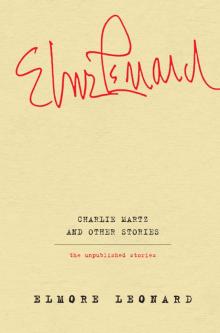 Charlie Martz and Other Stories: The Unpublished Stories
Charlie Martz and Other Stories: The Unpublished Stories Elmore Leonard's Western Roundup #2
Elmore Leonard's Western Roundup #2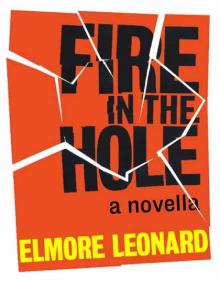 Fire in the Hole
Fire in the Hole Tishomingo Blues (2002)
Tishomingo Blues (2002)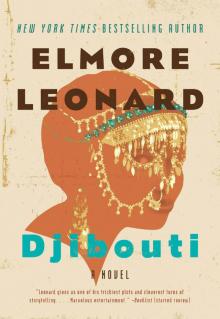 Djibouti
Djibouti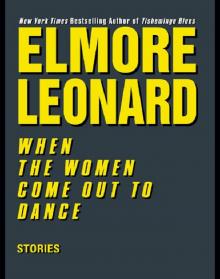 When the Women Come Out to Dance: Stories
When the Women Come Out to Dance: Stories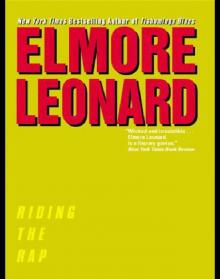 Riding the Rap
Riding the Rap Moment of Vengeance and Other Stories
Moment of Vengeance and Other Stories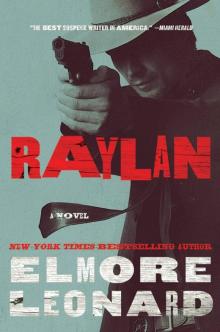 Raylan
Raylan Touch
Touch Mr Majestyk
Mr Majestyk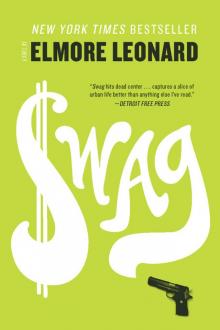 Swag
Swag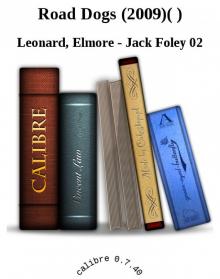 Road Dogs
Road Dogs La Brava
La Brava The Hot Kid
The Hot Kid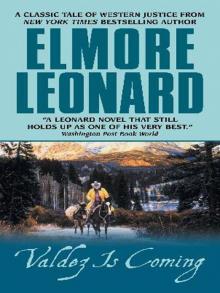 Valdez Is Coming: A Novel
Valdez Is Coming: A Novel Be Cool
Be Cool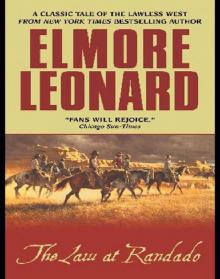 The Law at Randado
The Law at Randado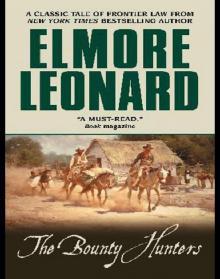 The Bounty Hunters
The Bounty Hunters When the Women Come Out to Dance
When the Women Come Out to Dance 310 to Yuma and Other Stories (1953)
310 to Yuma and Other Stories (1953)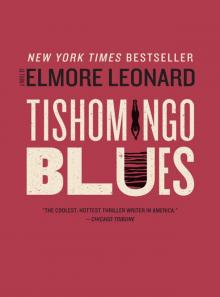 Tishomingo Blues
Tishomingo Blues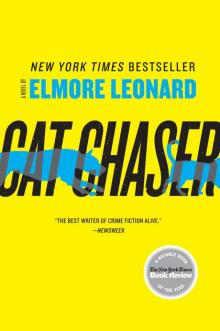 Cat Chaser
Cat Chaser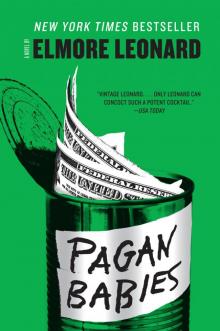 Pagan Babies
Pagan Babies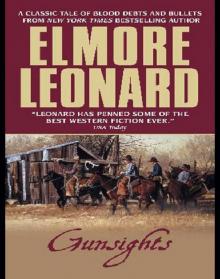 Elmore Leonard's Western Roundup #1
Elmore Leonard's Western Roundup #1 52 Pickup
52 Pickup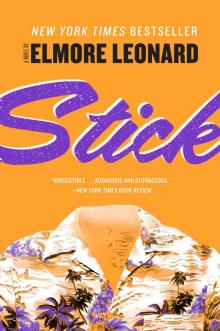 Stick
Stick The Moonshine War
The Moonshine War Valdez Is Coming
Valdez Is Coming City Primeval
City Primeval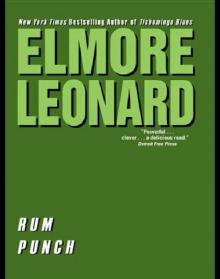 Rum Punch
Rum Punch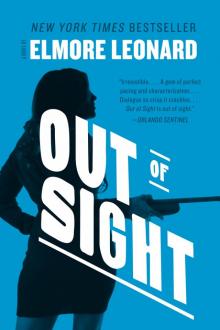 Out of Sight
Out of Sight Naked Came the Manatee (1996)
Naked Came the Manatee (1996)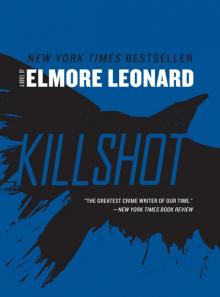 Killshot
Killshot Cuba Libre
Cuba Libre Forty Lashes Less One
Forty Lashes Less One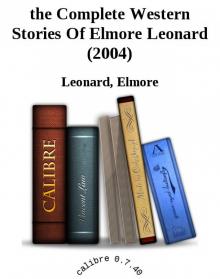 The Complete Western Stories of Elmore Leonard
The Complete Western Stories of Elmore Leonard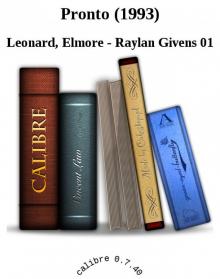 Pronto
Pronto Split Images
Split Images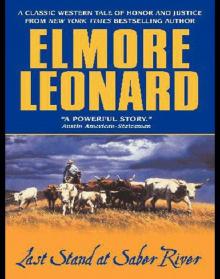 Last Stand at Saber River
Last Stand at Saber River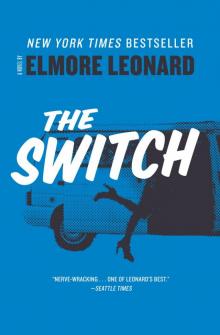 The Switch
The Switch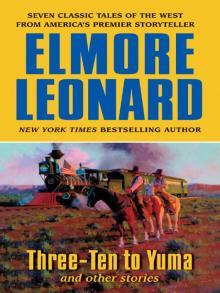 Three-Ten to Yuma and Other Stories
Three-Ten to Yuma and Other Stories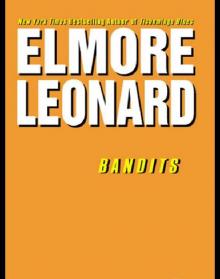 Bandits
Bandits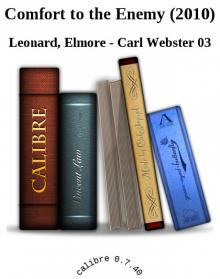 Comfort to the Enemy and Other Carl Webster Stories
Comfort to the Enemy and Other Carl Webster Stories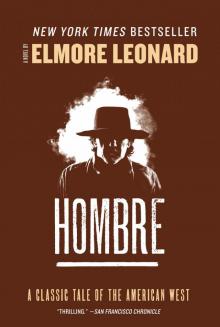 Hombre
Hombre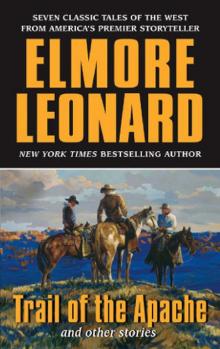 Trail of the Apache and Other Stories
Trail of the Apache and Other Stories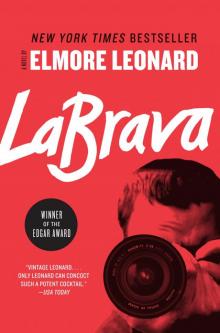 LaBrava
LaBrava Gold Coast
Gold Coast Jackie Brown
Jackie Brown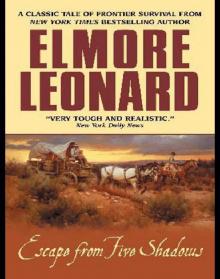 Escape From Five Shadows
Escape From Five Shadows Karen Makes out (1996)
Karen Makes out (1996)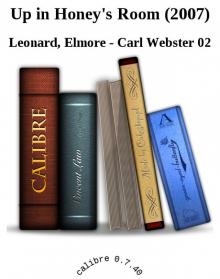 Up in Honey's Room
Up in Honey's Room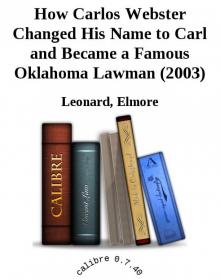 How Carlos Webster Changed His Name to Carl and Became a Famous Oklahoma Lawman (2003)
How Carlos Webster Changed His Name to Carl and Became a Famous Oklahoma Lawman (2003)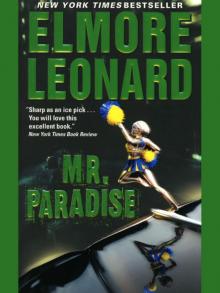 Mr. Paradise
Mr. Paradise The Hunted
The Hunted Freaky Deaky
Freaky Deaky Louly and Pretty Boy (Ss)
Louly and Pretty Boy (Ss)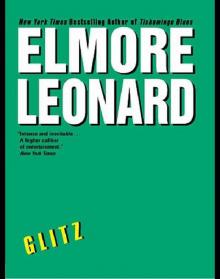 Glitz
Glitz A Coyote's in the House
A Coyote's in the House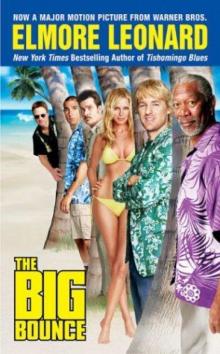 The Big Bounce jr-1
The Big Bounce jr-1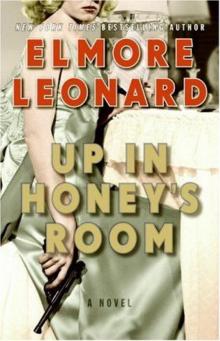 Up in Honey's Room cw-2
Up in Honey's Room cw-2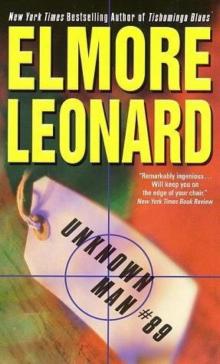 Unknown Man #89 jr-3
Unknown Man #89 jr-3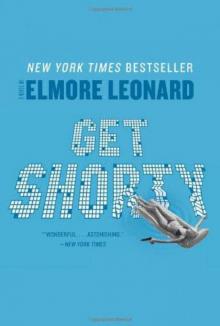 Get Shorty: A Novel cp-1
Get Shorty: A Novel cp-1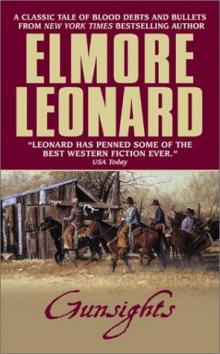 Gunsights
Gunsights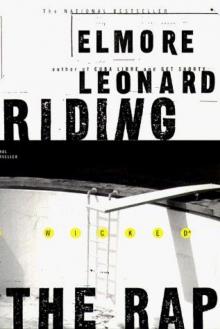 Riding the Rap rg-2
Riding the Rap rg-2